This article is more than
7 year oldThe young Japanese working themselves to death
Michiyo Nishigaki was a proud mother when her only son Naoya landed a job at a large Japanese telecoms company, straight out of college.
He loved computers, and it seemed like a great opportunity in Japan's competitive graduate jobs market.
But just two years later things started to go wrong.
"He was telling me he'd been busy, but he said he was OK," Ms Nishigaki tells me. "But then he came home for my father's funeral and he couldn't get out of bed. He said: 'Let me sleep a while, I can't get up. Sorry mum but let me sleep'."
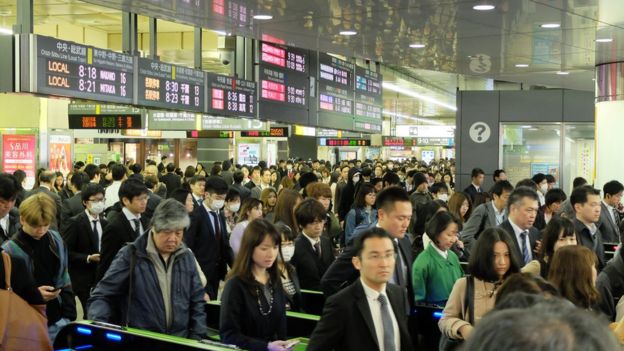
Later she learned from colleagues that he'd been working around the clock.
"He usually worked until the last train, but if he missed it he slept at his desk," she said. "In the worst case he had to work overnight through to 10pm the next evening, working 37 hours in total."
Two years later Naoya died at the age of 27 from an overdose of medication. His death was officially rule a case of "karoshi" - the Japanese term to describe death attributed to overwork.
Japan has a culture of long working hours and this is not a new phenomenon - it was first recorded in the 1960s - but recently high-profile cases have thrust karoshi back into the spotlight.
Monthly hours
On Christmas Day in 2015, 24-year-old Matsuri Takahashi, an employee at the Japanese advertising agency Dentsu, jumped to her death.
It emerged she had barely slept after working more than 100 hours of overtime a month in the period leading up to her death.
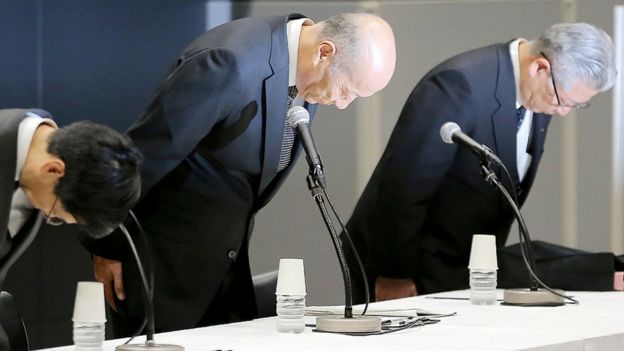
Dentsu's president Tadashi Ishii (centre) resigned, a year after Ms Takahashi's death
Makoto Iwahashi says that is not unusual, particularly for new starters in a company. He works for Posse, an organisation that runs a helpline for young workers, and says most of the calls are complaints about long working hours.
"It's sad because young workers think they don't have any other choice," he tells me. "If you don't quit you have to work 100 hours. If you quit you just can't live."
Mr Iwahashi says declining job security have made the situation worse.
"We had karoshi is the 1960s and 70s, the big difference is they had to work long hours but they were secured lifetime employment. That's not the case anymore."
Overtime culture
Official figures put cases of karoshi in the hundreds each year, counting heart attacks, strokes and suicides. But campaigners say the real figure is much higher.
Nearly a quarter of Japanese companies have employees working more than 80 hours overtime a month, often unpaid, a recent survey found. And 12% have employees breaking the 100 hours a month mark.
Those numbers are important; 80 hours overtime a month is regarded as the threshold above which you have an increased chance of dying.
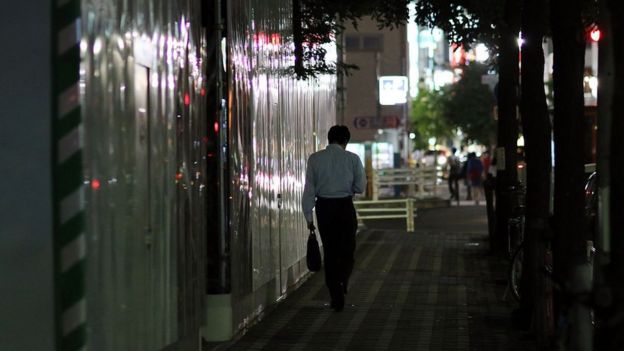
Nearly a quarter of Japanese companies have employees working more than 80 hours overtime a month
Japan's government has been under increasing pressure to act, but the challenge has been to break a decades-old work culture where it's frowned upon to leave before your colleagues or boss.
Earlier this year the government introduced 'Premium Fridays', encouraging firms to let their employees out early, at 3pm, on the last Friday each month. They also want Japanese workers to take more holiday.
Workers are entitled to 20 days leave a year but currently about 35% don't take any of it.
Turning off the lights
In the local government offices in Toshima, a district of downtown Tokyo, they have resorted to turning the office lights off at 7pm in an effort to force people to go home.
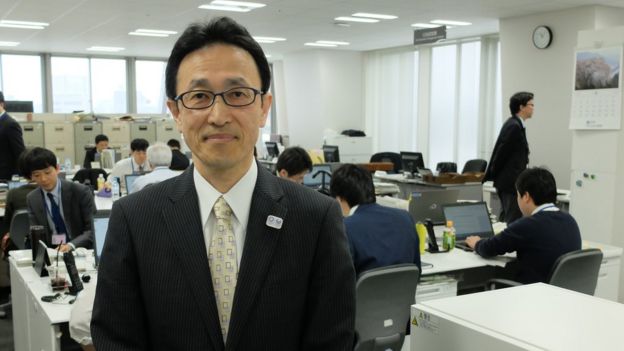
"We wanted to do something visible," says manager Hitoshi Ueno.
"It's not just about cutting working hours. We want people to be more efficient and productive, so that everyone can protect and enjoy their spare time. We want to change the work environment in total."
In focusing on efficiency he may have a point. While the country may have some of the longest working hours it is the least productive of the G7 group of developed economies.
But campaigners say these measures are piecemeal and fail to address the core problem: that young workers are dying because they are working too hard and for too long.
The only solution they say is to put a legal limit on the overtime employees are permitted to work.
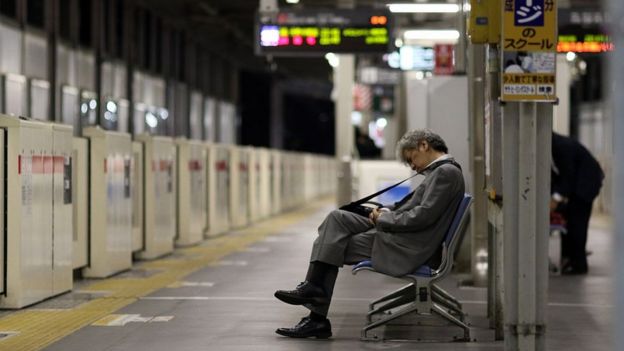
Japan may have some of the longest working hours it is the least productive of the G7 group of developed economies
Earlier this year the government proposed limiting average overtime to 60 hours a month though firms would be allowed to up this to 100 hours during "busy periods" - well into the karoshi red zone.
More needed
Critics say the government is prioritizing business and economic interests at the expense of the welfare of workers.
"The Japanese people count on the government but they are being betrayed," says Koji Morioka, an academic who has studied the karoshi phenomenon for 30 years.
In the meantime, more young workers are dying and the support groups for bereaved families keep getting new members.
Michiyo Nishigaki, who lost her son Naoya, says the country is killing the very workers it should be cherishing.
"Companies just focus on short-term profits," she says. "My son and other young workers don't hate work. they are capable and they want to do well.
"Give them the opportunity to work without long hours or health problems and the country would be privileged to have them."
Newer articles
<p>The ceremony was held in Moscow amid a tense geopolitical situation and diplomatic rift with the West</p>
West has a decision to make – Putin
Free Madonna concert draws crowd of 1.6m to Brazil’s Copacabana beach
Hamas tells Qatari, Egyptian mediators it agrees to ceasefire proposal
Labour's Sadiq Khan easily wins record third term as mayor of London
Fans stunned by TV star’s weight loss
Craig David, a hitmaker since 2000, is still getting audiences dancing
Drake denies allegations by Kendrick Lamar of underage sex and harbouring secret child
Bombshell new theory on Titan sub disaster
Doja Cat’s pre-Met Gala wardrobe malfunction




